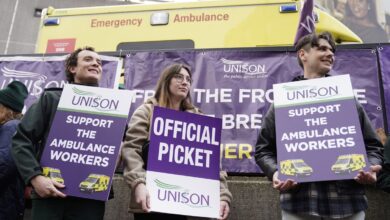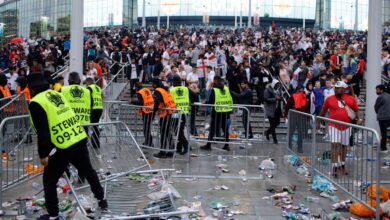The asylum seekers stuck in hotel rooms for months on end

In a small darkened room where the scent of damp lingers, two toddlers sit quietly on a double bed. The sisters, Elva and Gabriela, stare vacantly at the blotched ceiling and mould-speckled walls. Their father, Carlos, stands by despairingly. This cramped space is all his daughters know.
The El Salvadorian national arrived in the UK last September with his wife, Aline, and their two girls – aged one and two – after being “caught in the crossfire” of gang violence. They had hoped to find a place for their children to grow up in relative safety and comfort. Instead, they have been stuck in a hotel room perched on a busy A-road in West London for eight months, banned from working and with only a £32 a week for the family to live on.
Two double beds pushed together take up most of the room. The small amount of space that remains is filled with household items – an ironing board, a small fridge, a high chair, toys. Wedged in a corner is a desk cluttered with baby wipes, formula and bottles, along with an electric hob and kitchen utensils.
“My babies are coughing because of the fungus,” says Carlos, 35, a man of slender build with weary eyes indicating regular sleepless nights. “A month ago we got bed bugs. They got pest control in only last week. We were waiting a long time. My babies were uncomfortable. They couldn’t sleep.”
A tiny bathroom ensuite is filled with drying clothes and a pile of items – bags, children’s books, shoes – that do not fit in the main room. In the sink is a wooden spoon and a bottle of washing up liquid beside the tap along with the family’s toothbrushes.
“I can’t provide for them, I feel useless,” says Carlos, close to tears. “As a father, I feel useless.”
While Boris Johnson and home secretary Priti Patel focus on immigration plans such as the controversial Rwanda deportation policy, or finding homes for Ukrainian refugees, the issues faced by Carlos and his family are the reality for an increasing number of asylum seekers, forced to live in government-funded hotels while they await a decision on their claims to stay in the UK. This form of housing used to be rare, but surged during the pandemic as Covid restrictions meant housing was not available. At the time, ministers described it as a “temporary measure”.
By last month, despite the end of Covid rules, some 28,621 asylum seekers were living in 220 hotels across the country, an increase of 177 per cent since February 2021 – when the Home Office pledged to “accelerate” the movement of asylum seekers out of hotels and into housing – according to figures seen by The Independent. The hotels are run by three companies: Serco, Clearsprings Ready Homes and Mears Group.
Government guidance states asylum seekers should not be held in this “contingency accommodation” for more than 35 days, but figures obtained under the Freedom of Information Act reveal that, as of the end of September 2021, two-thirds of all asylum seekers in hotels – including 1,079 children – had passed that limit. Nearly 1,000 had spent more than six months in hotel rooms, with 356 longer than a year. The Home Office declined to provide more recent data, claiming it needed to consider whether the disclosure would “prejudice the effective conduct of public affairs”.
As the numbers rise, so too do the fears for asylum seekers. A welfare concern about asylum seekers in hotels is reported to the Home Office every 30 minutes, on average, according to the Independent Chief Inspector of Borders and Immigration (ICIBI).
In London, a severely disabled teenage girl from Kuwait is spending her ninth month in a London hotel room, forced to lie on the floor, without a bathroom in which she can wash properly. In Skegness, a young man from Kurdistan is forced to wait days before receiving any medical attention for intense stomach pains, ultimately being taken to hospital by ambulance. Two small children are left without anywhere to play except a car park or exposed hotel corridor.
Their cases are far from isolated. The problem is growing and, experts warn, cannot continue without a human cost.
When Ahmed arrived in Britain last November, he was already traumatised. The Iraqi Kurdish national had fled from his home due to threats over his political beliefs and made his way to France. From there, he paid smugglers to travel by small boat to the UK, arriving just hours before 27 people died attempting the dangerous crossing.
The 20-year-old has been in a hotel in a rural part of Skegness, Lincolnshire, for seven months. He says that several weeks after being placed there, he began having stomach pains. He says he tried to ask for help, but to no avail.
“Every time I went down to tell the hotel staff they would tell me I can go to the GP myself, but I was in too much pain and I didn’t have money for a taxi so I couldn’t go,” he says. “They said they would call a GP for me. I did that a couple of times, but they never came. The hotel staff didn’t say why. They kept saying, ‘Go up to your room, the GP will come.’ I was begging them to let me see a GP for three days. I was in so much pain. It was constant.”
Their living conditions are intolerable
Several days later, the pain became so excruciating during the night that Ahmed cried out for help. An ambulance was called and arrived an hour later. He was taken to hospital where he stayed overnight. He says there was no interpreter there so his diagnosis wasn’t properly communicated to him, but he was given an injection and medication.
Figures obtained by The Independent reveal many asylum seekers such as Ahmad have needed ambulances called out to hotels. The data, disclosed through Freedom of Information requests, shows just 27 of the 226 hotels were responsible for 1,495 callouts in the year to last October – more than one a week. Of these, more than half led to a patient being taken to hospital.
Experts say this is a symptom of a lack of access to healthcare. The contractors running the hotels on behalf of the Home Office are required to support people with registering with GPs, but those working with asylum seekers warn this does not always happen.
Dr Durga Sivasathiaseelan, of Doctors of the World, says that while the charity was initially able to support asylum seekers in hotels with registering with GPs and accessing health services, a change in the way the Home Office shares data in January has prevented them from helping.
Carlos and Aline’s bathroom is cluttered with belongings as they have no proper storage
Labour says Priti Patel needs to ‘get her house in order’





